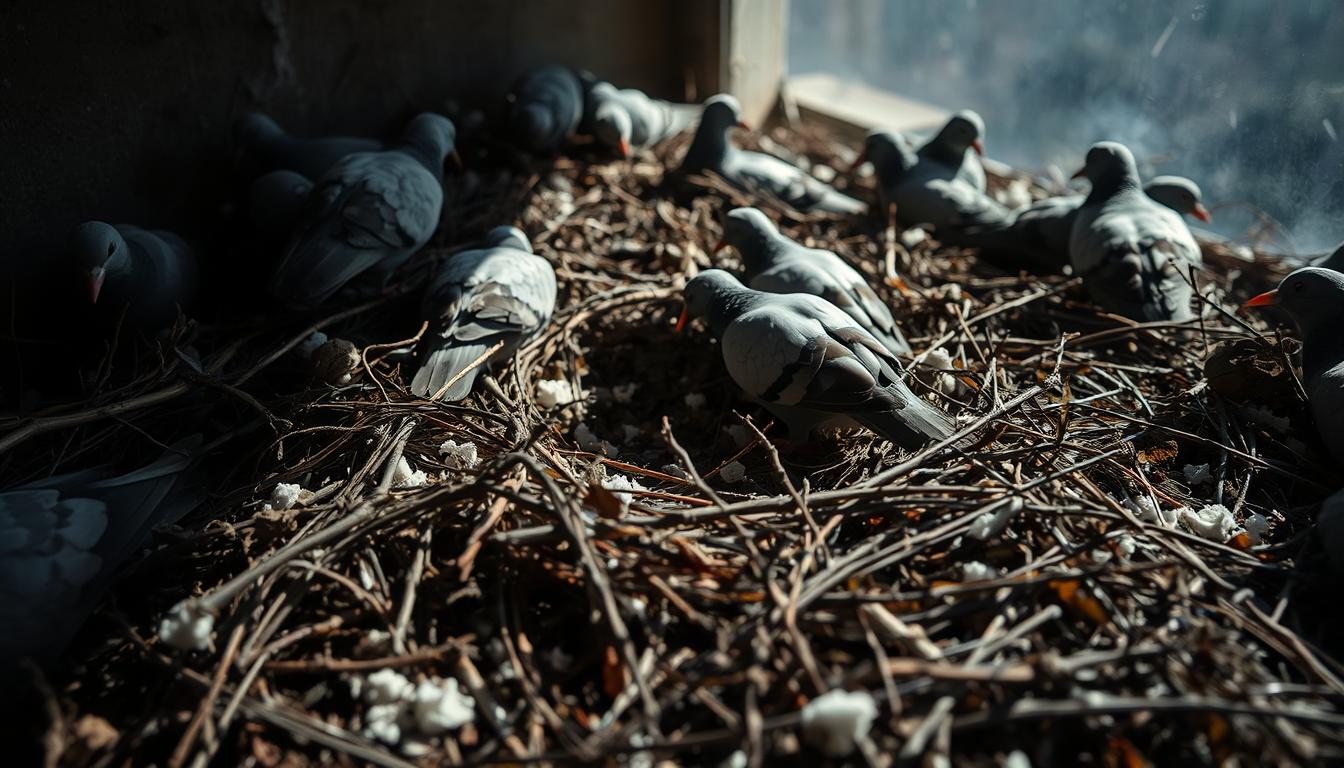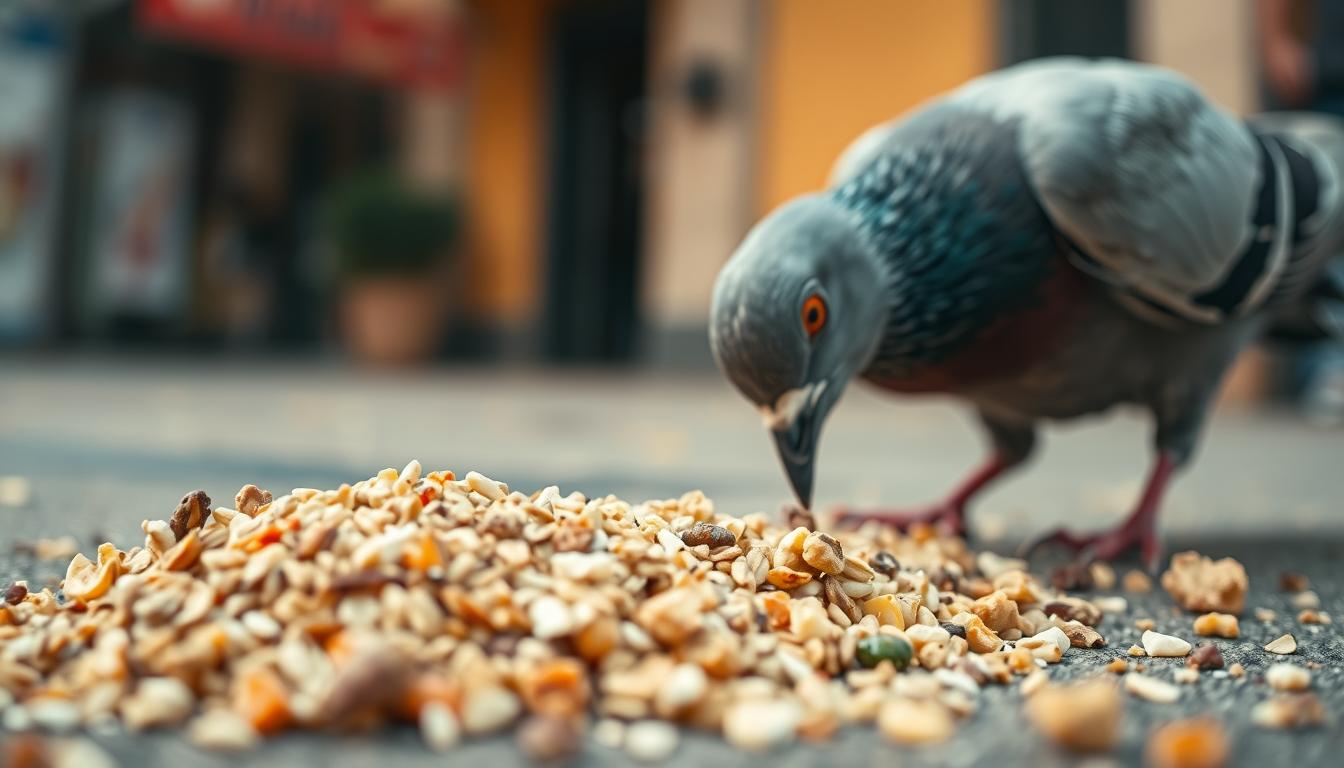Ever looked up and saw your place is a pigeon city? Those cute nests can turn into a big problem fast. People all over the U.S. are welcoming these birds without knowing it.
Pigeon nests are more than just a mess. They can damage your property, harm your health, and grow fast. Knowing what attracts them is key to keeping them away.
Many face pigeon problems that could be stopped. Whether it’s a business or home, spotting the signs early can save a lot of money. It’s about knowing where pigeons like to nest.
This guide will show you the top five mistakes that draw pigeons in. You’ll learn how to make your place less inviting to these birds. It’s all about spotting the nesting spots and changing your habits.
Table of Contents
Understanding Pigeon Nests and Their Impact
Urban wildlife brings unique challenges, especially with pigeon nests. These birds are great at making city structures their homes. Knowing how they nest can help protect your property from pigeons.
What Are Pigeon Nests?
Pigeon nests are small homes made from twigs, grass, and trash. Female pigeons build them in safe spots. They can start laying eggs at just six months old, breeding fast.
Common Locations for Pigeon Nests
Pigeons find many places to nest in cities. They often choose:
- Building ledges
- Roof overhangs
- Air conditioning units
- Abandoned structures
- Bridge supports
The Risks Associated with Pigeon Nests
Pigeon nests can harm property owners. They can cause:
- Property damage from droppings
- Potential disease transmission
- Structural deterioration
- Attraction of additional pest species
Pigeons can raise multiple broods annually, rapidly expanding their population in favorable environments.
It’s important to know about pigeon nests and their effects. This knowledge helps manage urban wildlife. By being informed, you can stop pigeons from taking over your property.
The Importance of Prevention
Keeping your property safe from pigeons means acting early. Waiting too long can lead to big problems and costly fixes.
Stopping pigeons before they start is key. These birds can harm your property with their droppings and nests. Knowing the risks helps you act fast.
Why Prevention Matters
Prevention has many benefits for property owners:
- It reduces damage from pigeon droppings
- It lowers health risks from birds
- It saves money on repairs
- It keeps your property looking good
Health Risks from Pigeon Infestations
Pigeon droppings are not just ugly—they’re dangerous. They can carry harmful germs that might make people sick. Dust from dried droppings can also hurt your lungs.
Protecting your environment starts with understanding the risks and taking preventive measures.
Big health worries include:
- Cryptococcosis – a fungal lung disease
- Histoplasmosis – an infection that inflames the lungs
- Many bacterial infections
Using early pest control can greatly reduce pigeon risks. It helps keep your property safe and sound.
Mistake 1: Ignoring Nesting Sites
Keeping your property bird-free starts with knowing where birds like to nest. Bird control experts say pigeons look for safe and sheltered spots to build their homes.
- Flat and sheltered surfaces
- Elevated areas with good visibility
- Spaces near food and water sources
- Structures with minimal human disturbance
Identifying Ideal Pigeon Nesting Areas
Your property might be attracting nuisance birds without you realizing it. Common nesting spots include:
- Roof ledges and cornices
- Balcony overhangs
- Solar panel edges
- Abandoned equipment
- Gaps in building structures
How to Assess Your Property
Do a detailed check for entry points and sheltered spots. Bird control strategies should aim to remove these attractive nesting zones. Professional checks can spot hidden weaknesses that might not be obvious.
Proactive prevention is key to managing nuisance birds effectively.
Ignoring nesting sites can lead to big issues. For example, birds nesting under solar panels can cut down energy efficiency. This can cost a lot to fix, hundreds or thousands of dollars.
Mistake 2: Not Securing Garbage and Food Sources
Urban wildlife, like pigeons, are experts at finding food in unexpected spots. Your waste management can turn your place into a feast for these birds. It’s key to keep food sources safe to manage pests well.
Pigeons love human waste and will make your place their home if they find food. Unsecured trash makes your property a hotspot for urban wildlife.
Food Attraction for Pigeons
Pigeons seek out easy food. They’re especially drawn to:
- Open garbage containers
- Uncovered food waste
- Outdoor eating areas
- Improperly stored pet food
Tips for Secure Waste Management
To fight pest management issues, try these tips:
- Use sealed garbage containers with tight-fitting lids
- Clean outdoor eating areas right after use
- Store pet food in airtight containers
- Regularly clean trash bins to remove food residue
- Avoid leaving food scraps exposed
Proactive waste management is your best defense against unwanted urban wildlife visitors. By keeping food out of reach, you lower the chance of pigeon problems.
Mistake 3: Neglecting Property Maintenance
Keeping your property well-maintained is key to stopping pigeons from nesting. Weak spots in your building can attract these birds. It’s important to understand how upkeep affects bird control.
Structural problems make your building a great spot for pigeons to nest. Issues like damaged roofs and unsealed areas invite them in. These problems are more than just a nuisance.
Critical Maintenance Practices
- Inspect roof and exterior walls quarterly for potential entry points
- Repair cracked or damaged building surfaces immediately
- Clean gutters and remove debris regularly
- Seal potential nesting areas with appropriate bird control materials
- Check ventilation and architectural gaps for potential nest locations
Structural Integrity and Nesting Risks
Pigeons look for safe spots to nest. Weak spots like loose roof tiles, damaged eaves, or unsealed building gaps are perfect for them. Their droppings can harm your building, especially stone, metal, and concrete.
Proactive maintenance is your best defense against unwanted pigeon populations.
Ignoring your property’s upkeep can cost you a lot. Bird droppings can damage concrete, leading to expensive fixes. Regular checks and quick fixes are essential to keep pigeons away.
Mistake 4: Failing to Employ Deterrents
To keep your property safe from feral pigeons, you need good bird deterrents. These stop pigeons from nesting and roosting. Without them, pigeons can damage your property and pose health risks.

The best bird deterrents use different methods to scare pigeons away. Knowing these strategies helps protect your property from pigeon infestations.
Effective Deterrent Options
- Physical Barriers
- Bird spikes (3-4 inches long)
- Bird netting with black rubber-coated wire mesh
- Sloping PVC sheets at 45-degree angles
- Visual Deterrents
- Reflective tape
- Predator decoys (moving plastic owls)
- Reflective discs or hanging rods
- Sound-Based Solutions
- Sonic devices with ultrasonic frequencies
- Devices emitting predator bird sounds
- Audible alarms with flashing lights
Implementation Strategies
When setting up bird deterrents, keep these tips in mind:
- Look at your property’s layout
- Use a mix of deterrent types
- Move or change visual deterrents often
- Keep and replace deterrent systems
Pro tip: For better results, consider hiring a pest control service. They offer advanced deterrents that can cut pigeon numbers by up to 60%.
Mistake 5: Delaying Action on Nest Removal
Putting off nest removal can lead to big problems. Pigeons are very good at making nests and having babies. A pair can have up to six sets of babies a year. So, it’s important to remove nests quickly to stop them from taking over.
When you find a pigeon nest, you should act fast. These birds can travel far to get back to their nests. Waiting too long can let them make a big home.
The Importance of Prompt Intervention
Quick action has many benefits:
- It stops the population from growing too fast
- It helps avoid damage to your property
- It lowers health risks from pigeon poop
- It breaks up long-term nesting habits
Safe Nest Removal Techniques
“Professional wildlife removal ensures humane and effective nest management” – Urban Wildlife Control Experts
Here are some safe ways to remove nests:
- Wear gloves and masks for protection
- Use gentle methods to avoid hurting the birds
- Seal up any spots where they might nest again
- Check local laws before you start
Pro tip: If you’re not sure how to remove a nest, call a professional wildlife removal service. They can do it safely and legally.
Recognizing Signs of Infestation
Spotting a pigeon problem early can save you a lot of trouble. Pigeons can quickly go from a small problem to a big threat. Knowing the warning signs is key to keeping your place safe.
Pigeons leave signs that show they might be taking over. Spotting these signs early can help you act fast:
- More pigeons around your place
- Droppings on surfaces
- Nesting materials in hidden spots
- Strange sounds like cooing
- Always seeing birds in one spot
Common Indicators of a Pigeon Problem
Droppings are a clear sign of pigeons. More droppings mean a bigger problem. These droppings are not just ugly. They can also spread diseases like histoplasmosis and salmonellosis.
How to Monitor Your Property
Regular checks are important for keeping pests away. Make a list to follow:
- Look at roof edges and ledges
- Check for nesting spots
- Keep track of pigeon activity
- Clean nesting areas
- Put up deterrents
Remember, nuisance birds like areas where pigeons have been before. So, clean well.
By being alert and taking action, you can stop pigeons from making your place their home.
Best Practices for Pigeon Nest Prevention
To keep your property pigeon-free, you need a solid bird control plan. Pigeons can turn your place into a mess with their nesting. Knowing the right steps can stop them from making your property their home.

Good bird control means using many prevention methods. Here are some ways to make your place less appealing to pigeons:
- Install physical barriers like bird spikes on ledges and railings
- Use reflective devices to create visual deterrents
- Implement motion-activated sprinklers
- Apply non-toxic bird repellents
- Seal potential entry points
Creating an Unwelcoming Environment
To make your property less welcoming to pigeons, you must keep up the effort. Pigeons are opportunistic nesters who look for safe spots. By removing nesting sites and making surfaces hard to land on, you can keep them away.
Regularly Checking for New Nest Sites
It’s important to check your property often to stop pigeon nests. Look closely at:
- Roof edges and corners
- Balconies and overhangs
- Solar panel installations
- Architectural crevices
- Unused equipment or structures
Remember, early detection and intervention are key to successful pigeon nest prevention.
By using these bird control methods, you can lower the chance of pigeon nests on your property. Keep up with maintenance and use smart deterrents to protect your space from pigeon damage and health risks.
Legal Considerations Around Nest Removal
Dealing with wildlife removal laws can be tricky, especially in cities. It’s important for property owners to know the rules about removing pigeon nests. This helps avoid legal problems.
- Most bird species are protected by the Migratory Bird Treaty Act (MBTA).
- Removing nests with eggs or young birds can lead to big fines.
- Local laws about wildlife removal can vary.
Understanding Local Regulations
Every area has its own way of handling urban wildlife. Here are some important points:
- Always check local laws before removing nests.
- You might need permits to move nests.
- Know which bird species are protected.
Wildlife Protection Laws and Pigeons
Not all pigeons are treated the same under the law. House Sparrows, European Starlings, and feral Rock Pigeons are often seen as invasive. This means you can usually remove their nests without a special permit. But, native birds need more care and might require a pro.
Professional wildlife removal services know these laws well. They can guide you through the rules and ensure animals are treated humanely. Prices for their services vary, from $150 to $1,500, based on the job’s complexity and local rates.
When to Seek Professional Help
Pigeon problems can grow from small annoyances to big issues needing expert help. Knowing when to call in bird control pros can save you time, money, and health risks.
It’s important to spot severe pigeon problems early. You might need experts if you see:
- Many pigeons always on your property
- Droppings that damage buildings
- Nesting in hard spots
- Health risks from droppings
Signs Your Infestation Requires Experts
When DIY doesn’t work, it’s time for pros. Look for these signs:
- Structural damage from acidic droppings
- Disease risks
- Fast-growing pigeon numbers
- Nests near dangerous spots like electricals
How to Choose the Right Pest Control Service
Choosing the right pest control is key. Look for:
- Experience in bird control
- Humane removal methods
- Full property checks
- Long-term prevention plans
- Proper licenses and insurance
Effective pigeon management needs more than just removing them.
Get professional help when DIY fails. A skilled pest management expert can offer lasting bird control solutions.
Conclusion: Your Role in Pigeon Nest Management
To keep your property safe from pigeon nests, you need to act early and smart. Knowing the dangers of these birds helps you find good ways to stop them. Using bird deterrents is key to protecting your place from pigeon damage and health risks.
Managing pigeon nests well means spotting them early and keeping up with maintenance. You should check your property often for nesting spots, keep food away, and use bird deterrents wisely. Doing these things can really help stop pigeons from making nests on your property.
Summary of Key Points
Your plan should include checking your property well, putting up bird deterrents, and removing nesting spots fast. Remember, pigeon nests can harm your building and health. A good prevention plan will keep your place safe and clean.
Taking Action to Protect Your Property
First, inspect your property well to find nesting spots and use bird deterrents. If pigeons are hard to get rid of, think about getting help from pest control. Your efforts will keep your property safe from pigeon problems.
FAQ
How quickly can pigeons build a nest?
Pigeons can build a nest in just 2-3 days. It’s important to act fast to stop them. They like places that are safe, stable, and close to food, like building ledges and balconies.
Are pigeon nests dangerous to my health?
Yes, pigeon nests and droppings can be very dangerous. They carry diseases like histoplasmosis and cryptococcosis. These can cause serious lung infections in people. Also, their droppings can make floors slippery and attract other pests.
How often do pigeons reproduce?
Pigeons can breed all year but usually have 2-3 cycles a year. A female pigeon can lay 2 eggs at a time. This means she can have up to 8 babies a year. It’s important to act quickly to stop them from taking over.
What are the most effective pigeon deterrents?
Good pigeon deterrents include bird spikes and reflective surfaces. You can also use sound devices that birds don’t like. Anti-roosting gels make surfaces uncomfortable for birds.
Is it legal to remove pigeon nests?
It depends on where you are. Pigeons are not usually protected, but some places have special rules. Always check local laws before removing nests. It’s a good idea to get help from a pest control service to make sure you’re following the rules.
How can I prevent pigeons from nesting on my property?
To keep pigeons away, seal up holes and remove food sources. Use bird deterrents and keep your property clean. Check for nesting sites often and fix any damage. Make sure garbage areas are clean and secure.
When should I call a professional for pigeon control?
Call a professional if you see:
– Lots of pigeons around
– A lot of droppings or nesting materials
– Damage to your building from birds
– Your DIY efforts haven’t worked
– You’re worried about health risks from too many birds
How harmful are pigeon droppings?
Pigeon droppings are very corrosive. They can damage buildings, make floors slippery, and spread diseases. They also attract pests and can cause structural problems if not cleaned up.
Can I remove a pigeon nest with eggs?
Removing nests with eggs is tricky and might be against the law. It’s best to:
– Talk to local wildlife authorities
– Use humane ways to scare them away
– Get professional advice
– Don’t remove eggs without permission
How much does professional pigeon control cost?
The cost of pigeon control depends on:
– How bad the problem is
– The size of your property
– What methods you choose
– Where you are
– Prices usually range from 0 to
FAQ
How quickly can pigeons build a nest?
Pigeons can build a nest in just 2-3 days. It’s important to act fast to stop them. They like places that are safe, stable, and close to food, like building ledges and balconies.
Are pigeon nests dangerous to my health?
Yes, pigeon nests and droppings can be very dangerous. They carry diseases like histoplasmosis and cryptococcosis. These can cause serious lung infections in people. Also, their droppings can make floors slippery and attract other pests.
How often do pigeons reproduce?
Pigeons can breed all year but usually have 2-3 cycles a year. A female pigeon can lay 2 eggs at a time. This means she can have up to 8 babies a year. It’s important to act quickly to stop them from taking over.
What are the most effective pigeon deterrents?
Good pigeon deterrents include bird spikes and reflective surfaces. You can also use sound devices that birds don’t like. Anti-roosting gels make surfaces uncomfortable for birds.
Is it legal to remove pigeon nests?
It depends on where you are. Pigeons are not usually protected, but some places have special rules. Always check local laws before removing nests. It’s a good idea to get help from a pest control service to make sure you’re following the rules.
How can I prevent pigeons from nesting on my property?
To keep pigeons away, seal up holes and remove food sources. Use bird deterrents and keep your property clean. Check for nesting sites often and fix any damage. Make sure garbage areas are clean and secure.
When should I call a professional for pigeon control?
Call a professional if you see:
– Lots of pigeons around
– A lot of droppings or nesting materials
– Damage to your building from birds
– Your DIY efforts haven’t worked
– You’re worried about health risks from too many birds
How harmful are pigeon droppings?
Pigeon droppings are very corrosive. They can damage buildings, make floors slippery, and spread diseases. They also attract pests and can cause structural problems if not cleaned up.
Can I remove a pigeon nest with eggs?
Removing nests with eggs is tricky and might be against the law. It’s best to:
– Talk to local wildlife authorities
– Use humane ways to scare them away
– Get professional advice
– Don’t remove eggs without permission
How much does professional pigeon control cost?
The cost of pigeon control depends on:
– How bad the problem is
– The size of your property
– What methods you choose
– Where you are
– Prices usually range from $300 to $1,500 for full services
,500 for full services
Source Links
- All-Natural Pest Control Tips to Try at Home – https://www.thespruce.com/natural-pest-control-prevention-tips-7090566
- Pigeon Nesting Habits and Behavior: An In-depth Look – https://birdfact.com/articles/pigeon-nesting
- Why Do Pigeons Keep Coming Back To My House? – https://www.hawkeye.ca/blog/why-do-pigeons-keep-coming-back-to-my-house
- The Importance of Humane Bird Control For Commercial Properties – Wild Goose Chase – https://wildgoosechasers.com/bird-pigeon-control-geese-removal-blog/the-importance-of-humane-bird-control-for-commercial-properties/
- How to Keep Pigeons Away? A Complete Solutions Guide for 2024 – https://hicare.in/blog/how-to-keep-pigeons-away/
- solar panel bird proofing – bird netting for solar panels in Las Vegas – https://americanpestcontrol.com/solar-panel-bird-proofing-in-las-vegas-protect-your-investment-and-keep-your-panels-clean/
- How to Get Rid of Grackles and Starlings – https://www.hawkeye.ca/blog/how-to-get-rid-of-grackles-and-starlings
- “Bird Made Its Nest In My Mop”: 50 People Share Pictures Of Nests In The Most Random Places (New Pics) – https://www.boredpanda.com/funny-bird-nests-unusual-places/
- Pest Control In The Waste Management Industry: Best Practices | Pest Defence – https://www.pestdefence.co.uk/news/pest-control-waste-management-industry-best-practices/
- Feeding ecology of the common wood pigeon (Columba palumbus) in a major European city – https://pmc.ncbi.nlm.nih.gov/articles/PMC11286133/
- Bird Droppings And Property Damage | Skedaddle Toronto – https://www.skedaddlewildlife.com/location/toronto/blog/how-bird-droppings-can-damage-your-property/
- Who Is Responsible for Pest Control, Landlords or Tenants? – RentPrep – https://rentprep.com/blog/property-maintenance/responsible-pest-control-landlords-tenants/
- Prevent Pigeons from Perching – Rosie On The House – https://rosieonthehouse.com/blog/prevent-pigeons-from-perching/
- What Should I do When a Bird Nests Near my House? – https://www.skedaddlewildlife.com/location/montreal/blog/what-should-i-do-when-a-bird-nests-near-my-house/
- How to Keep Pigeons Away – Today’s Homeowner – https://todayshomeowner.com/pest-control/guides/how-to-keep-pigeons-away/
- What’s Really Going On at Your Bird Feeder? Watch for These Clues – https://www.allaboutbirds.org/news/power-struggles-are-playing-out-at-your-feeder-heres-what-to-look-for/
- How Pigeons Find Their Home? The Secrets Behind Their Incredible Homing Ability – https://www.birdfy.com/blogs/blogs/how-pigeons-find-their-home-the-secrets-behind-their-incredible-homing-ability?srsltid=AfmBOooXpeZEyLYQsgyrITeOGIaF6u2cKYGF8KIshR0sxMjFhDxOTdj5
- Bird Control Guide: How to get rid of pigeons? – https://www.nomorebirds.co.nz/how-to-get-rid-of-pigeons/?srsltid=AfmBOoq7EsLz5chEJoHeHl-jMydNTplLFVP09MXD4o3WdKSka7r0tGkJ
- How to Identify and Deal with a Pigeon Infestation. – https://countybirdcontrol.co.uk/how-to-identify-and-deal-with-a-pigeon-infestation-in-your-property/
- How To Get Rid Of Pigeons: A Complete Guide – https://aviancontrolinc.com/get-rid-of-pigeons/
- The Risks of Pigeon Nests and How to Address Them – Green Machine Pest Control | Top Rated in Arizona – https://www.greenmachinepest.com/pigeon-nests/
- I Found a Pigeon Nest. What Do I Do? – https://www.hawkeye.ca/blog/i-found-a-pigeon-nest-what-do-i-do
- Bird Nest Removal Do’s and Don’ts for a Safe & Clean Environment – https://wildremoval.com/bird-nest-removal-dos-and-donts/
- I Found a Bird Nest in a Bad Location – What Can I do to Help? – https://gl.audubon.org/news/i-found-bird-nest-bad-location-–-what-can-i-do-help
- Managing Risks of Pigeons in Urban Areas | Green City Times – https://www.greencitytimes.com/managing-risks-of-pigeons-in-urban-areas/
- How To Deal With Pigeon Problems in the Winter – Westchester Wildlife – https://westchesterwildlife.com/blog/pigeon-problems-in-the-winter/
- What to do about pigeons – https://www.humaneworld.org/en/resources/what-do-about-pigeons
- Pigeon Guano Removal: Safe Methods & Tips | Cleanse Force UK | Cleanse Force UK – https://www.cleanseforceuk.co.uk/post/pigeon-guano-removal
- A Guide to Bird Nests & Eggs – https://www.rspb.org.uk/whats-happening/news/brilliant-broods-a-guide-to-eggs-and-nests




